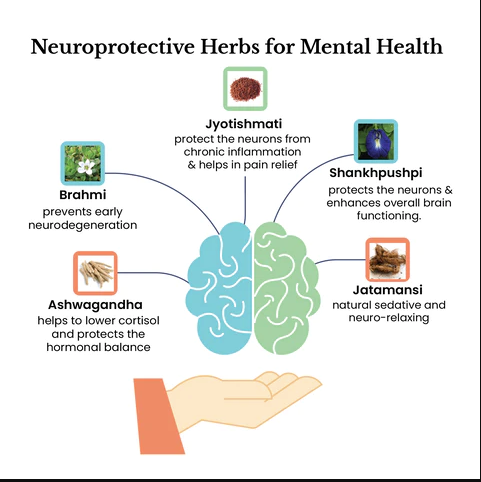Ayurvedic Treatment for Depression: 7 Secrets to Natural Well-being

Ayurveda, a holistic healing system developed over 5,000 years ago in India, emphasizes balance in all areas of life. It teaches that harmony between the body, mind, and spirit is essential for health and wellness. In Ayurveda, mental health is not viewed in isolation but as an integral part of one’s overall health. The system uses a comprehensive approach, incorporating diet, lifestyle changes, herbal remedies, and physical practices like yoga and meditation to promote mental well-being.
Understanding Depression Through an Ayurvedic Lens
In Ayurveda, depression is understood as an imbalance in the body’s fundamental energies, known as doshas. These doshas — Vata, Pitta, and Kapha — govern all physical and mental processes. Depression often arises when there’s a disturbance in these energies, leading to an imbalance that affects the mind. Vata imbalance, for example, can cause anxiety and fear, Pitta imbalance may lead to anger and irritability, and Kapha imbalance can result in lethargy and sadness. Ayurveda seeks to identify the root cause of these imbalances and address them through a personalized treatment plan.
Having Problems With Depression?
Get Help from Experts from the Comfort of Home
Strategies for Ayurvedic Treatment for Depression
Ayurvedic treatment for depression focuses on restoring dosha balance through a multi-faceted approach:
Herbal Remedies: Ayurveda prescribes a variety of herbs that help balance the doshas and support mental health. Ashwagandha, for instance, is known for its adaptogenic properties, helping to reduce stress and anxiety. Brahmi boosts brain function and alleviates symptoms of depression.
Dietary Adjustments: An Ayurvedic diet tailored to an individual’s dosha type can significantly impact mental well-being. Foods that are natural, fresh, and dosha-balancing are recommended. For example, warm, grounding foods help balance Vata, cooling foods soothe Pitta, and light, stimulating foods help balance Kapha.
Lifestyle Changes: Ayurveda emphasizes a routine that promotes balance. Regular sleep patterns, daily exercise, and practices like meditation and yoga are encouraged to support mental health.
Panchakarma: This detoxification process is designed to cleanse the body of toxins that can affect mental health. Procedures like Shirodhara (pouring of warm oil on the forehead) are particularly effective for calming the mind and relieving symptoms of depression.
Yoga and Meditation: These practices are integral to Ayurvedic treatment for depression, helping to calm the mind, reduce stress, and improve emotional regulation.
Herbal Remedies and Their Benefits

Ayurveda utilizes a variety of herbs known for their ability to balance the doshas and enhance mental well-being. These herbs offer natural ways to treat depression and its symptoms.
Ashwagandha (Withania somnifera): Known for its adaptogenic properties, Ashwagandha helps the body manage stress. It reduces cortisol levels, enhancing mental clarity and energy. Studies indicate that Ashwagandha can significantly reduce symptoms of stress and anxiety.
Brahmi (Bacopa monnieri): Brahmi is revered for its brain-boosting properties. It enhances cognitive functions, including memory, concentration, and learning capacity. Brahmi’s adaptogenic effects also help in reducing stress and anxiety, common in depression.
Turmeric (Curcuma longa): Curcumin, the active compound in turmeric, has potent anti-inflammatory and antioxidant properties. It’s been shown to boost brain-derived neurotrophic factor (BDNF), which can help reverse and prevent depression symptoms.
Saffron (Crocus sativus): Studies have found saffron to be effective in treating mild to moderate depression, potentially due to its mood-enhancing properties. It’s considered as effective as certain conventional antidepressants.
Lifestyle Adjustments for Managing Depression
Incorporating Ayurvedic lifestyle adjustments can significantly impact managing depression:
Techniques in Ayurvedic Treatment of Depression Includes:
Regular Sleep Patterns: Ayurveda emphasizes the importance of a consistent sleep schedule. Going to bed and waking up at the same time every day helps balance the doshas and improve mental health.
Daily Exercise: Physical activity, especially yoga, is recommended to reduce depression symptoms. Yoga helps balance the mind and body, reducing stress and improving mood.
Meditation and Pranayama: Regular meditation and breathing exercises (Pranayama) are crucial for calming the mind, reducing stress, and enhancing emotional well-being.
Nature Connection: Spending time in nature and sunlight can help balance Vata and improve mood, reducing feelings of depression.
Ayurvedic Diet for Mental Well-being
Ayurvedic Treatment for Depression, focuses on balancing the doshas through nutrition, which can have a profound effect on mental health:
Vata-Balancing Foods: Warm, cooked, grounding foods help stabilize Vata. Include sweet fruits, cooked vegetables, grains like rice and oats, dairy products, nuts, and seeds.
Pitta-Balancing Foods: Cooling, hydrating, and mildly spicy foods help soothe Pitta. Favor vegetables like cucumbers and leafy greens, sweet fruits, grains like wheat and barley, and dairy products.
Kapha-Balancing Foods: Light, warm, and stimulating foods help counteract Kapha’s heaviness. Opt for spicy foods, leafy greens, legumes, and fruits like apples and pears.
Yoga and Meditation: Tools for Emotional Balance
Yoga and meditation are cornerstone practices in Ayurvedic treatment for depression. recognized for their profound benefits on mental health. These practices offer a natural and effective way to achieve emotional balance and alleviate symptoms of depression.
Yoga: Yoga combines physical postures, breathing exercises, and meditation to promote physical and mental well-being. Specific yoga poses like Balasana (Child’s Pose) and Setu Bandhasana (Bridge Pose) are known to reduce stress and anxiety. A study published in the Journal of Alternative and Complementary Medicine found that yoga significantly decreases depression severity by improving neurotransmitter levels and enhancing mood.
Meditation: Meditation, particularly mindfulness meditation, has been shown to reduce symptoms of depression and anxiety. It encourages a state of awareness and present moment focus, which helps break the cycle of negative thoughts. Research indicates that regular meditation practice can lead to changes in brain regions associated with depression, reducing symptoms.Ayur
How to Begin Your Ayurvedic Journey for Mental Health?

Starting an Ayurvedic journey for mental health involves integrating holistic practices into daily life. Here’s how to begin:
Consult an Ayurvedic Practitioner: A certified Ayurvedic practitioner can provide personalized recommendations based on your dosha type and specific health needs.
Incorporate Ayurvedic Diet: Begin by adjusting your diet to balance your doshas, focusing on fresh, whole foods that promote mental well-being.
Adopt a Daily Routine: Establish a consistent daily routine that includes regular sleep times, yoga, meditation, and other self-care practices.
Practice Yoga and Meditation: Start with simple yoga poses and meditation techniques, gradually incorporating more as you become comfortable.
Use Herbal Remedies Wisely: Consult with an Ayurvedic practitioner to identify the most beneficial herbs for your condition and how to use them safely.
Why Opt for an Psychiatrist Online Consultation ?
Convenience: No need to travel. Consult from the comfort of your home.
Privacy: Ensures confidentiality and discretion.
Flexibility: Flexible appointment slots to suit your schedule.
Expertise: Access to renowned psychologist consultants like Dr. Prakhar Jain.
Conclusion
Ayurveda offers a comprehensive approach to managing depression, emphasizing balance and holistic well-being. Through dietary adjustments, lifestyle changes, herbal remedies, and the practices of yoga and meditation, individuals can find relief from symptoms of depression and achieve emotional balance using ayurvedic treatment for depression. Starting an Ayurvedic journey requires a commitment to self-care and may involve guidance from experienced practitioners. By embracing Ayurveda’s principles, one can embark on a path toward improved mental health and overall wellness, harnessing the power of this ancient healing system to foster a happier, healthier life.

Dr. Prakhar Jain is a Psychiatrist in Mumbai, and has an experience of 7 years in this field.
Quick Links
-
Homepage
-
About Us
- Our Services
- Our Blog
-
Contact Us
- Privacy Policy
